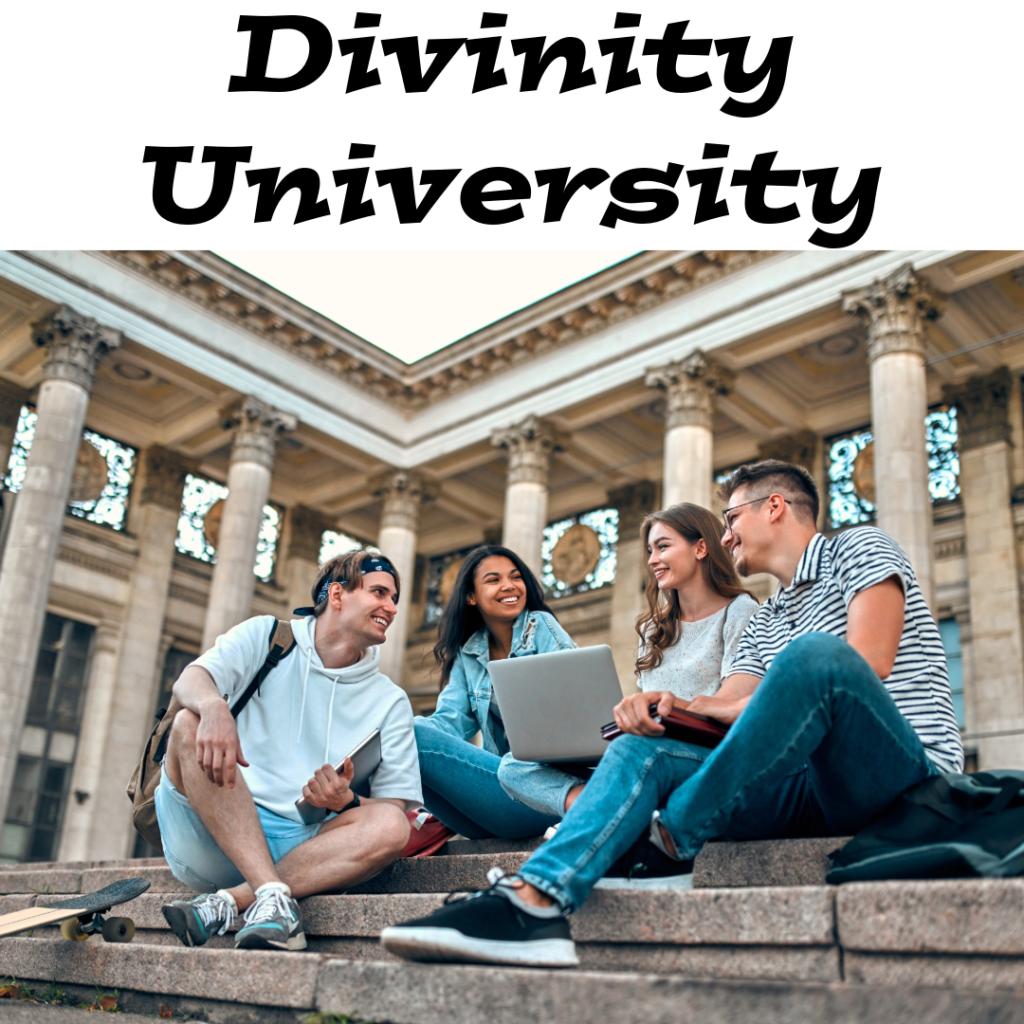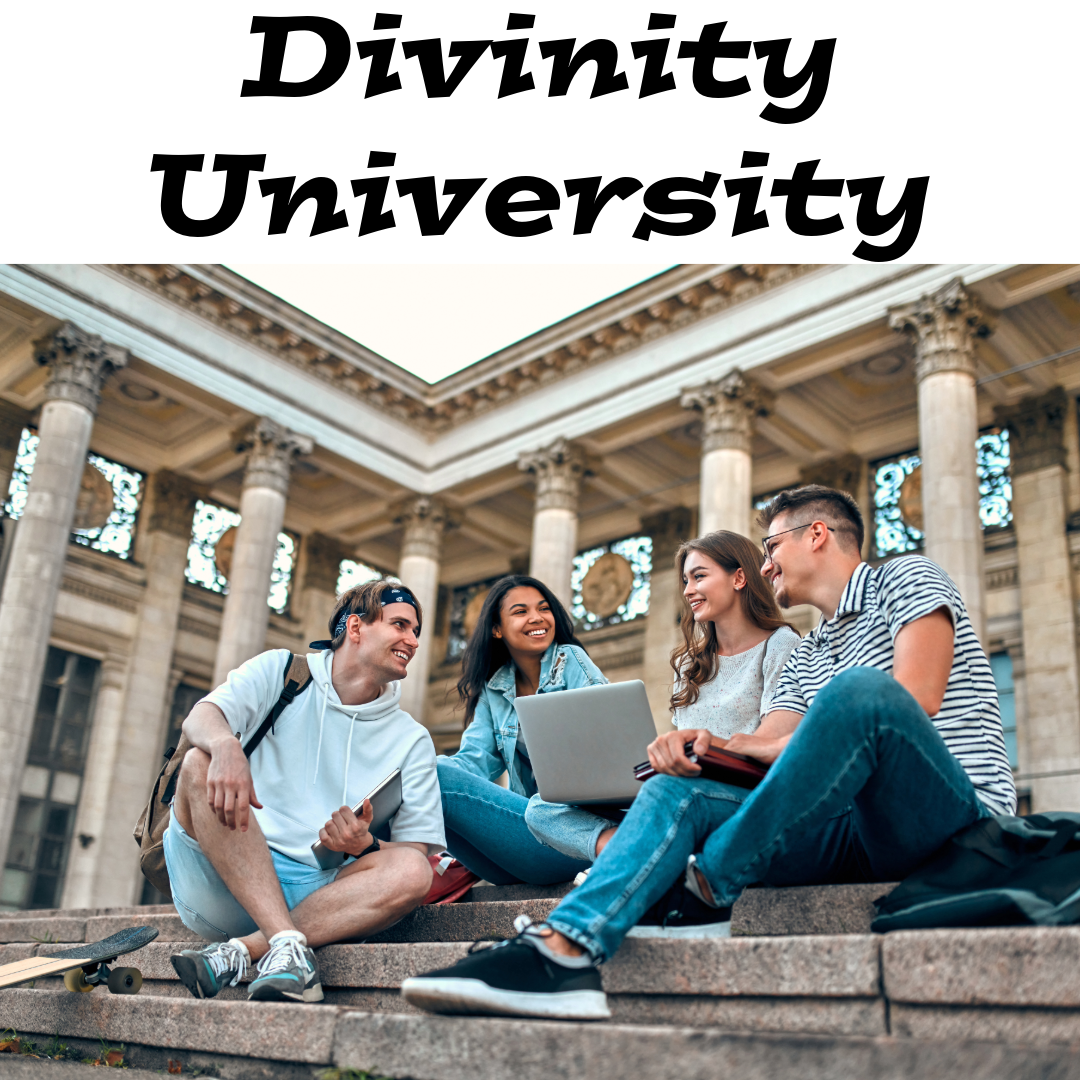Divinity University: Founded on the principles of spiritual enlightenment and academic excellence, Divinity University stands as a beacon of knowledge and wisdom in the realm of theology and spirituality. With a deep commitment to nurturing the soul and fostering personal growth, our institution offers a diverse range of programs and resources designed to inspire, educate, and empower individuals on their spiritual journey. At Divinity University, we believe in the transformative power of education and the profound impact of spirituality on individual well-being and societal harmony. Join us as we embark on a journey of discovery, enlightenment, and personal transformation.

History of Divinity Education:
Origins of Divinity Education
The roots of divinity education can be traced back to ancient civilizations, where religious instruction played a central role in societal development. In early cultures, priests and sages were responsible for transmitting religious knowledge and rituals to the masses. The formalization of divinity education can be observed in the establishment of ancient religious schools and academies, where aspiring clergy received training in theology, scripture, and spiritual practices.
Evolution Over Time
Over the centuries, divinity education evolved in response to cultural, religious, and intellectual shifts. During the Middle Ages, monastic orders and cathedral schools became centers of theological learning, preserving and disseminating religious texts and teachings. The Protestant Reformation ushered in a new era of theological education, with the founding of Protestant seminaries and universities dedicated to training clergy and scholars in the principles of the Reformation. In the modern era, divinity education has continued to adapt to changing societal needs and academic trends, incorporating interdisciplinary approaches and embracing diversity in theological perspectives.
Key Figures and Movements in Divinity Education
Throughout history, divinity education has been shaped by influential figures and movements that have left a lasting impact on the field. From early theologians and religious reformers to contemporary scholars and activists, key figures in divinity education have contributed to the development of theological thought, pedagogy, and practice. Movements such as the Scholasticism of the Middle Ages, the Enlightenment, and Liberation Theology have sparked debates, inspired reforms, and challenged traditional paradigms in divinity education, shaping the landscape of religious scholarship and ministry.
Degrees and Programs Offered:
Undergraduate Programs
Divinity University offers a diverse range of undergraduate programs tailored to meet the needs and interests of aspiring students. From Bachelor of Divinity degrees to interdisciplinary majors in religious studies, our undergraduate programs provide a solid foundation in theology, scripture, ethics, and pastoral care. Students engage in rigorous academic coursework, hands-on experiential learning, and practical training opportunities, preparing them for a variety of vocations in ministry, education, social services, and beyond.
Graduate Programs
Our graduate programs are designed to deepen students’ theological knowledge, enhance their critical thinking skills, and prepare them for advanced leadership roles in religious institutions, academia, and the public sphere. With Master of Divinity, Master of Theology, and Doctor of Ministry degrees, as well as specialized tracks in areas such as pastoral counseling, biblical studies, and interfaith dialogue, Divinity University offers a comprehensive array of graduate programs that cater to diverse career aspirations and academic interests.
Specialized Certificates and Training
In addition to degree programs, Divinity University offers specialized certificates and training programs for individuals seeking to deepen their understanding of specific theological topics or enhance their professional skills in ministry and pastoral care. From certificates in spiritual formation and worship leadership to training programs in chaplaincy, counseling, and community outreach, our specialized offerings provide flexible, accessible pathways for lifelong learning and personal enrichment.
Online vs. On-Campus Options
At Divinity University, we understand the importance of flexibility and accessibility in higher education. That’s why we offer both online and on-campus options for our degree and certificate programs, allowing students to choose the format that best fits their needs and preferences. Our online programs feature interactive coursework, virtual classrooms, and asynchronous learning opportunities, enabling students to engage with faculty and peers from anywhere in the world. On-campus students benefit from face-to-face instruction, immersive learning experiences, and access to campus resources and facilities. Whether online or on-campus, Divinity University is committed to providing high-quality education that prepares students for meaningful and impact careers in ministry and beyond.
Teaching Methods and Pedagogy:
Lecture-Based Instruction
At Divinity University, lecture-based instruction serves as a foundational component of our teaching methodology. Through engaging lectures delivered by esteemed faculty members, students are introduced to key concepts, theories, and theological principles in a structured and systematic manner. Lectures provide a framework for understanding complex topics, facilitating knowledge acquisition, and stimulating critical thinking skills. Additionally, lectures often incorporate multimedia presentations, guest speakers, and interactive Q&A sessions to enhance student engagement and promote deeper learning.
Seminar Discussions
Complementing lecture-based instruction, seminar discussions offer students the opportunity to engage in collaborative learning and critical dialogue with peers and faculty members. In seminar settings, students explore and analyze course materials, share insights and perspectives, and engage in respectful debate and discourse on relevant theological issues. Facilitated by knowledgeable instructors, seminars encourage active participation, independent thinking, and the exchange of diverse viewpoints. Through small-group discussions and Socratic inquiry, students develop analytical skills, communication abilities, and a deeper understanding of course content.
Experiential Learning Opportunities
Divinity University is committed to providing experiential learning opportunities that bridge academic study with real-world application. From field trips and service-learning projects to internships and practicum experiences, students have the chance to integrate theoretical knowledge with practical skills in diverse settings. Experiential learning fosters hands-on engagement, personal growth, and professional development, allowing students to gain valuable insights, perspectives, and competencies that enrich their educational experience and prepare them for ministry and service.
Research and Thesis Requirements
As part of our commitment to academic excellence and scholarly inquiry, Divinity University emphasizes research and thesis requirements as integral components of our programs. Through independent research projects, thesis writing, and scholarly presentations, students engage in rigorous academic inquiry, contribute to the advancement of knowledge in their field, and demonstrate mastery of specialized topics. Faculty mentors provide guidance and support throughout the research process, helping students refine research questions, conduct literature reviews, analyze data, and present their findings in a coherent and scholarly manner.
Accreditation and Affiliations:
Accreditation Standards for Divinity Schools
Divinity University adheres to rigorous accreditation standards set forth by recognized accrediting bodies in the field of theological education. Accreditation ensures that our programs meet established criteria for academic quality, faculty qualifications, student support services, and institutional effectiveness. By undergoing periodic reviews and assessments, we demonstrate our commitment to continuous improvement and accountability, maintaining the highest standards of excellence in spiritual education and academic integrity.
Affiliated Institutions and Partnerships
As part of our commitment to excellence and collaboration, Divinity University maintains affiliations with reputable institutions and partnerships within the academic and religious communities. Through collaborative initiatives, joint programs, and research partnerships, we leverage the expertise and resources of our partner institutions to enhance the quality of our educational offerings, expand opportunities for student engagement, and promote interfaith dialogue and cooperation.
Importance of Accreditation in Spiritual Education
Accreditation plays a critical role in ensuring the credibility, integrity, and quality of spiritual education. Accredited institutions undergo rigorous evaluations to ensure that they meet or exceed established standards of excellence in curriculum design, faculty qualifications, student support services, and institutional effectiveness. Accreditation provides assurance to students, employers, and the public that graduates of accredited programs have received a rigorous and comprehensive education that prepares them for leadership roles in ministry, academia, and the broader community. As a regionally accredited institution, Divinity University is committed to upholding the highest standards of academic excellence and ethical conduct in spiritual education.
Admission Process and Requirements:
Application Procedures
The application process for admission to Divinity University is designed to be comprehensive yet straightforward, ensuring that prospective students can navigate it with ease. Applicants can access the online application form through our website, where they will be guided through the necessary steps to complete their submission. Our user-friendly platform allows applicants to input their personal and academic information, upload required documents, and track the progress of their application in real-time.
Admission Criteria
At Divinity University, we value diversity, intellectual curiosity, and a genuine passion for spiritual exploration. While academic performance is certainly considered, we take a holistic approach to admissions, considering each applicant’s unique background, experiences, and potential contributions to our community. We seek individuals who demonstrate a commitment to personal and spiritual growth, as well as a desire to engage in rigorous academic inquiry and dialogue.
Required Documents and Interviews
As part of the application process, applicants are required to submit a variety of documents to support their candidacy. These may include official transcripts from previous academic institutions, letters of recommendation from mentors or educators, a personal statement outlining their academic and spiritual journey, and any additional materials requested by the admissions committee. Qualified candidates may also be invited to participate in an admissions interview, either in person or via video conference, to further assess their readiness for graduate-level study at Divinity University.
Financial Aid and Scholarships
We understand that financing a theological education can be a concern for many prospective students, which is why Divinity University is committed to offering a range of financial aid options to help make our programs accessible and affordable. Our dedicated financial aid office is available to assist students in navigating the various forms of aid available, including scholarships, grants, loans, and work-study opportunities. We encourage all applicants to explore these options and to reach out to our financial aid office with any questions or concerns they may have about financing their education.

Frequently Asked Questions:
1. How long does it take to complete a degree program at Divinity University?
The duration of our degree programs varies depending on the specific program and whether a student is enrolled on a full-time or part-time basis. Typically, our undergraduate programs require four years of full-time study to complete, while our graduate programs may range from one to three years, depending on the degree level and specialization. We also offer flexible scheduling options, including evening and weekend classes, to accommodate the needs of working professionals and non-traditional students.
2. What resources are available to support students during their time at Divinity University?
Divinity University is committed to providing comprehensive support services to ensure the success and well-being of our students. From academic advising and tutoring services to career counseling and spiritual formation opportunities, we offer a wide range of resources to meet the diverse needs of our student body. Additionally, our campus boasts state-of-the-art facilities, including libraries, chapels, and student lounges, where students can study, worship, and connect with peers in a supportive and enriching environment.
3. How does Divinity University foster a sense of community and belonging among students?
At Divinity University, we believe that community is an essential aspect of the educational experience. Through a variety of student organizations, extracurricular activities, and social events, we create opportunities for students to build meaningful relationships, forge connections, and cultivate a sense of belonging. Whether through attending weekly chapel services, participating in service projects, or joining a student-led Bible study group, students have ample opportunities to engage with one another, share their faith journeys, and support each other on their spiritual and academic paths.
Conclusion:
Divinity University is more than just an institution of higher learning; it is a vibrant community of scholars, seekers, and believers united by a shared commitment to spiritual growth and academic excellence. With a rich history, diverse curriculum, and supportive environment, Divinity University offers a transformative educational experience that prepares students to become compassionate leaders, ethical thinkers, and agents of positive change in the world. Whether you are embarking on a journey of theological exploration or seeking to deepen your spiritual understanding, we invite you to join us at Divinity University and embark on a path of discovery, enlightenment, and personal transformation.
Also Read:
